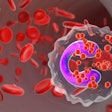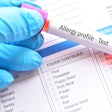
A basophil reactivity test (BAT) may soon serve as a reliable, predictive marker in tracking response to monoclonal antibody (mAb) treatments for severe, uncontrolled asthma.
The revelation comes from researchers in Alicante, Spain, in their study, “Utility of the Basophil Reactivity Test in the Clinical Management of People With Severe Uncontrolled Asthma.” The study was conducted at Dr. Balmis General University Hospital and published in the Journal of Asthma and Allergy. Researchers said their findings underscore the importance of BAT in pheno-endotyping and personalized asthma management.
Although asthma prognosis has improved significantly with the advent of mAbs, clinicians continue to face challenges in selecting the most appropriate biological treatment due to the lack of robust predictive markers. The study focused on 72 patients with severe, uncontrolled asthma, using anti-IgE antibodies to assess their basophil reactivity before initiating treatment with mAbs, including omalizumab, mepolizumab and benralizumab. Researchers recorded clinical characteristics, laboratory values and measures of respiratory function.
The study found an inverse association between basophil reactivity and asthma control. Specifically, patients with higher basophil reactivity (greater than or equal to 29%) exhibited lower complete response rates to mAbs, more frequent switches between mAbs and worse baseline lung function and Asthma Control Test (ACT) scores.
The study concluded that incorporating BATs into clinical practice could improve the specificity of asthma management guidelines and aid in the selection of appropriate mAb treatments. Notably, researchers found that the BAT was associated with poor response above specific cutoff values, including 10.5% for mepolizumab, 15.5% for omalizumab and 28% for benralizumab.
Researchers also noted that future research may explore alternative pathways, such as dupilumab or tezepelumab, for patients struggling with severe, uncontrolled asthma.























